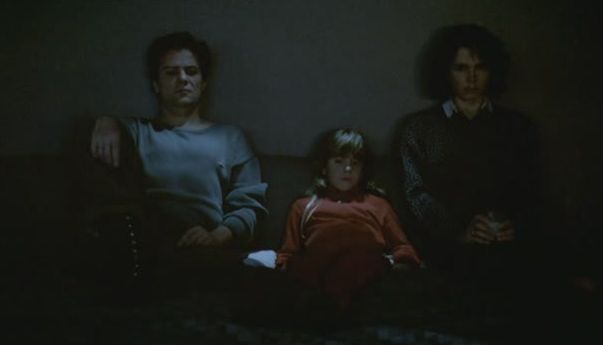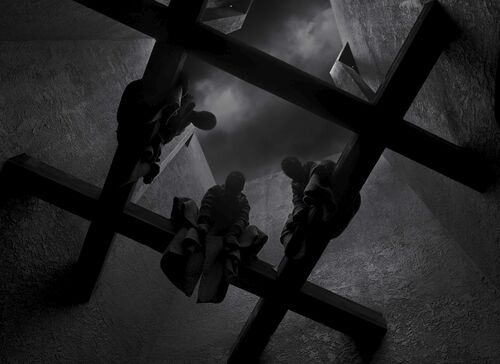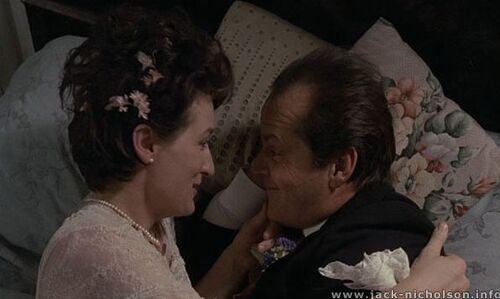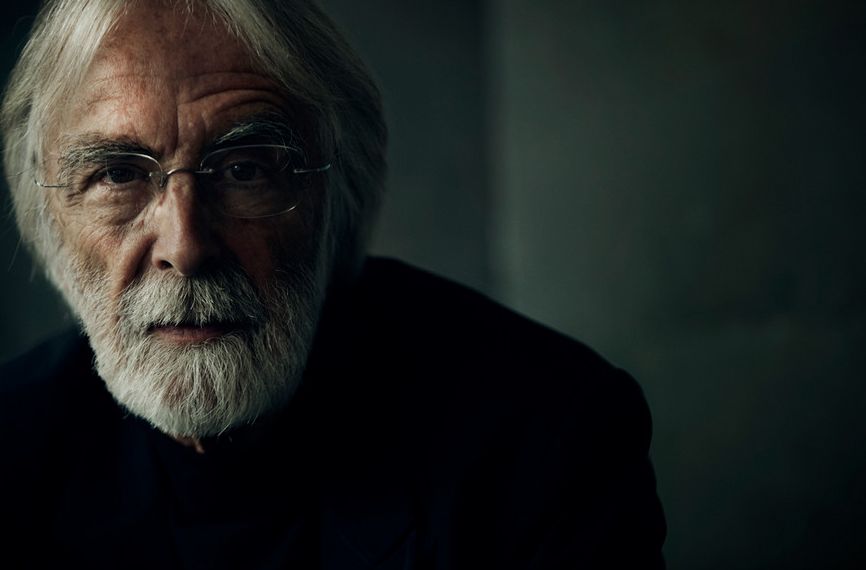
Exploring Michael Haneke through The Seventh Continent
 At some point, 2017 became the year I decided to further advance through the filmographies of directors I have desperately wanted to explore further. Now, it's Michael Haneke's turn.
At some point, 2017 became the year I decided to further advance through the filmographies of directors I have desperately wanted to explore further. Now, it's Michael Haneke's turn.
From my introduction to Michael Haneke, through his 1997 film Funny Games, I knew he shared an important quality with one of my favorite filmmakers. Like David Lynch, Michael Haneke doesn't care if the audience is comfortable while watching his films. Haneke extends his scenes past the point where the audience watching thinks is necessary, creating a hypnotic trance that one is unable to look away from. This ability of Haneke's to espouse the audience's attention and force the viewer to become an active participant in his films, thrusting us into an often much-needed self-examination. Haneke's feature film debut, The Seventh Continent takes an in-depth look at the lives of a family chained by the shackles of their expected existence willing to go to extreme measures to escape the monotonous confines of their daily existence.
The long takes Haneke favors throughout The Seventh Continent introduce the audience to a young family living in Europe that live in precisely the way that is expected of them. Georg Schober (Dieter Berner) works diligently at his career, always placing himself in the best possible position to advance through promotions and better situate himself in his profession. Anna Schober (Birgit Doll) works as an optometrist, but also steadfastly maintains her family's home, dutifully completing all the tasks and errands to keep the everyday lives of her family running. Anna is also reacting to the death of a parent, a loss which has devastated her brother. She has assumed the role of the strongly focused sibling taxed with the burden of maintaining her parents' business. The youngest member of the family, Evi, fills her time coloring pictures, doing her homework, and occasionally causing mischief at school by feigning blindness. Neither Georg's career advancements, Anna's mourning, nor Evi's misbehavior is consequential to the story—they are simply moments that happen in each of their lives and fills their days. This is precisely Haneke's point; most of what we do in our lives are mundane activities which simply fill our time until we die. Whether it be a scene filmed in real time at a car wash or listening to someone relay a story during an eye exam, Haneke gives us these moments in as similar a way as they actually occur, removing all sense of grandiose filmmaking, forcing the audience to see themselves in the lives of those depicted on screen. It's hypnotizing they way we can scoff at collective suicide, yet through watching the events that lead up to the act come to understand the universality of the expectations we adhere to. Every move is repetitive, the same food is served every day at breakfast, the same pommel horse is jumped over in gym class, the same filling station is visited when the car is low on fuel. We often live our lives thinking of the future, fooling ourselves into believing that the monotony we serve daily is crucial to our growth until we are shocked to realize that the future we have been striving towards has become the past. We get so lost in the day-to-day that we need Haneke to make clear that the way we actually live our lives doesn't make all that much sense once analyzed.
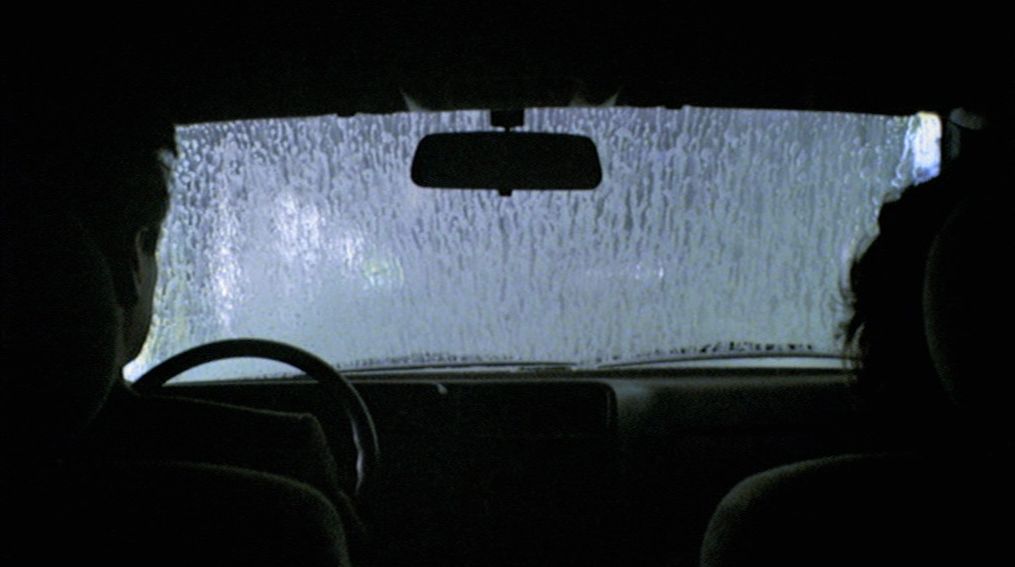
The cold emotionless state maintained in the Schober home is sobering to watch. No amount of intimacy brings the family closer together. Even after making love, Georg and Anna immediately return to the distance between each other that fills their days. Not only does one hardly see any affection between the members of the Schober family, but we also rarely see them enjoy conversations with each other. The cold, detached atmosphere isn't confined to their home, either. Each time they exchange currency for a service, the audience is afforded a glimpse into the lives of everyone they interact with, each doing their job or performing a service while all vitality seems to have been drained from their being. Through the entire runtime of The Seventh Continent, we don't see a single meaningful human connection. There is even a scene in which a man recently released from his employment with Georg, returns for his things and isn't given a single embrace of encouragement or a kind word. His appearance disrupts the work because he is unexpected, further cementing Haneke's notion that our lives are simply made up of a series of repeated actions, and we are stricken by the break from routine when interrupted. Despite the lack of compassionate connectivity, I would argue that Haneke's feature is one of the most humanistic films I have recently seen because it gives hope to our existence and alerts us to think critically about our society.
Haneke succeeds where other artists have failed in exposing the meaninglessness of life because he doesn't seem to assert that existence itself is meaningless, but rather, how we spend our existence is meaningless. To work our entire lives at jobs we are rarely impassioned towards is to admit our bondage to an economic system. Most of what we do in our lives is ascribed to us without question because it's simply what is to be done with one's life. You work a job, you raise a family, you purchase a home that you continue to pay for, often for the rest of your life. Decades of tradition dictate our future and we often accept each step of the ladder, as we ascend it, as progress because we have been so thoroughly convinced that this is how a life is properly lived. This system, which is endlessly defended, necessitates all of our free time being slated toward career advancement wherein stepping on someone to get ahead is expected, and more important than building a worthwhile human connection. Such a system establishes its own means for preservation by creating prisoners who will stop at nothing to advance the system because livelihood is more important than a life. When truly examined, it makes no sense that we spend our youth debilitating our bodies with the dwindling hope that we may be able to travel and relax when our bodies have deteriorated or our immune systems are compromised. It's also no wonder that in a system that places economy above all else, where a work-life balance has been destroyed due to the technology has infiltrated every aspect of our existence leaving us perpetually connected to anyone at any time, requires that protests take place during non-working hours that no longer exist. Time doesn't belong to our employers in exchange for a paycheck, and bastardizing the idea of independence from the societal structure that seeks to limit us is damaging to even those who believe they are willingly subjecting themselves to the economic constructs, which is a fallacy. By attacking the social establishment of existence rather than the act of living, Haneke opens a dialogue about the human individual and their place in the world rather than a commentary on whether or not their existence means anything.

A constant theme in The Seventh Continent is the persistence of diegetic noise from the radio throughout the film. When a dinner conversation between Georg, Anna, and her brother has the potential to turn emotional, Georg immediately seeks respite by turning on the radio. The alarm clock which wakes them up daily immediately fills their room and their lives with the trending news cycle. This constant noise further drives home the impression that despite the seemingly human interactions we have throughout our days, there remains, always, a divide between people. The radio also seems to serve as a representation for how often, and to what degree other's perception of the world perforates our own. Our lives are dictated by what we hear on the news and we accept the worldview we hear so much so that it is rarely even asked where our information originated in the first place. The news with which we start our day has the potential to shape our mindset and outlook, even our mental state, throughout our lives. Wielding such power to transcend our daily existence, the radio proves an exceptional tool to further adapting to the confines of society, familiar to us all, that Haneke masterfully presents in The Seventh Continent.
Subverting audience expectation once again; Michael Haneke takes the time typically reserved for bonding, the family meal, and shows how dissociative an engagement it has the potential to be. Collective eating is even highlighted as we reserve an entire day each November to eat and be around our friends and family. Due to the amount of time spent engaged with work, the meals we share with each other throughout the day are often the only opportunities we have to reconnect with the ones we share our lives with. People are brought together nightly at the dinner table and traditionally, meals have been reserved as a time to reconnect and discuss one's day. Despite this institution, Haneke shows how even meals can escape familial connectivity in The Seventh Continent. Twice a day we watch the Schober family eat together in a cold emotionless state where limited conversation takes place. Even after the decision is made that the family will kill themselves together, they still make sure to have their daily meals together as if nothing has changed. Just as the rest of their lives remained unchanged, mealtime was still a time that the family was cold and disconnected towards each other; maintaining emotional distance was as typical for the family as any other aspect of their daily lives.
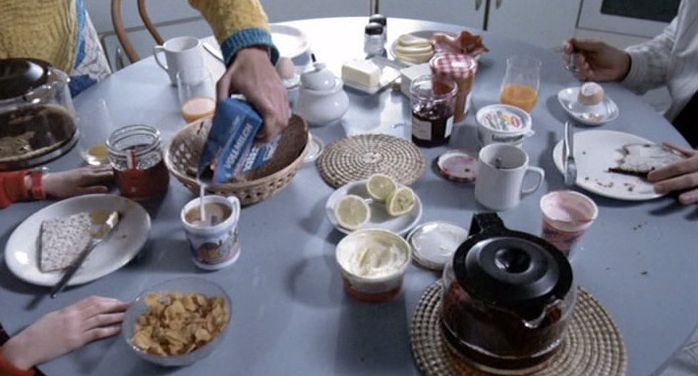
Dedicating over ten minutes to a scene in which the Schober family destroys their entire home and all their earthly possessions inside of it, Haneke creates a memorable sequence where we finally see the family rebelling from their self-imposed bindings created by the society they adhere to. Each member of the family destroyed everything that meant anything to them; demolishing their clothes, their furniture, their photos, even flushing their money down the toilet in the most overt nod to their rebellion from expectations. Where many may find the destruction scene random or sudden, it actually comes from the gradual robbery of the human spirit that takes place when one consistently trades their time for money. Everything in their home that they had worked towards was meaningless when considered what was given up to attain it. Most of what the audience saw the Schober family work towards was put toward home, body, and vehicle maintenance. The family didn't buy anything that brought great joy or togetherness into their home, rather, they bought food and took care of their car. Nothing they bought was important to them, it was only necessary in order to be able to continue to work and do what was expected of them; Their lives left no room for expression. When the daily grind of an unfulfilled life finally reaches its peak, you're bound to come unhinged towards the very items representative of your bondage.
Changing the audience from the spectator to the participant is the ultimate strength of director Michael Haneke. It is impossible for one to passively watch the visceral experience that a Haneke film presents. No matter how much we wish to believe we share nothing in common with the subjects in his films, Haneke will expose the fraud in such a belief. We may not destroy our homes and commit suicide, but we have undoubtedly all felt unfulfilled and unable to connect with the people throughout our shared life experience. We've certainly all fell victim to the drudgery of the grocery store or the car wash only driven by some invisible compulsion to do the things throughout the day that occupies most of our time. Seeing our own banal existence mirrored onscreen is an eye-opening experience into our own lives. The self-examination that results from Haneke's features is the by-product of becoming a participant in his films. The Seventh Continent doesn't simply present some relateable situations demanding the audience's attention; it goes much deeper than that. Haneke seamlessly brings audiences to the realm of their own philosophical evaluations. We must decide what we value, what is important to us, and what we expect out of our existence. We then must consider if the societal or economic systems we serve align with the values we assume. I took the day off work to watch Michael Haneke's feature film debut, The Seventh Continent, and as it turns out, my own small act of rebellion against societal expectations couldn't have been more suited for the material.
